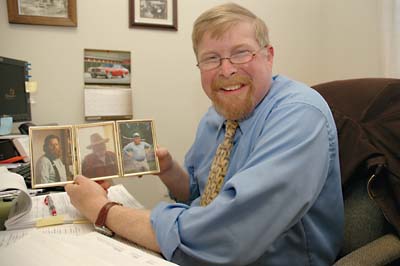By Dan Hust
MONTICELLO — Lou Setren has wrestled with health issues most of his life.
“I had been an insulin-dependent diabetic since the age of 10,” the county probation supervisor recalled.
That damaged his kidneys, forcing him to undergo dialysis three days a week while also dealing with diabetes’ constant requirements for needles, tests and vigilance. He was even legally blind for a while.
After suffering congestive heart failure, Setren underwent a kidney transplant in 1992, which took away the dialysis but not the diabetes.
Then, just six months ago, he had his pancreas replaced, and now the 50-year-old is diabetes-free.
“What a tremendous difference it has made,” Setren related. “To now not be a diabetic, talk about a life-changing event.”
The kidney Setren got from his older brother Bob also continues to function just fine nearly 20 years on.
In fact, his surgeon, Dr. Khalid Butt of Westchester Medical Center, told him that by the time he needs another kidney, “we’ll be cloning one for you.”
But those days are still a ways off, and the need is greater than ever for people willing to donate their organs – not just after they’ve passed away, but in life as well.
Setren has benefitted from both: his brother Bob continues to live a good life in Alaska with just one kidney, while the family of a 25-year-old unidentified man killed in an accident in Connecticut last year can take comfort in the fact that his pancreas put years more on Setren’s life.
But more than 100,000 people in the U.S. alone remain on waiting lists, about three-quarters of whom need a kidney.
That’s one of the reasons the National Kidney Foundation has designated March as National Kidney Month.
“Every month, more than 2,000 new names are added to the national waiting list for organ transplants, and about 18 people die every day while waiting for an organ transplant in the U.S.,” reads the foundation’s website, www.kidney.org. “Organ and tissue donation helps others by giving them a second chance at life.”
Setren first found that out through his brother, who joked after the five-hour surgery that if Setren ever won the lottery, Bob would be owed the first million dollars.
Setren kept his own two kidneys, but the one his brother gave him now handles his body’s needs. Pair that with the brand new pancreas he received at Beth Israel Deaconess Medical Center in Boston, and Setren feels – and looks – as healthy as a man 10 years his junior.
He must remain on anti-rejection drugs all his life, but he expects that to be the only long-term issue.
“I’ve been very blessed,” he affirmed.
And he hopes plenty more people will bless others through organ donation.
“I am an ardent advocate for the living donor program and people signing organ donor cards,” he remarked.
He noted how much work time is lost in America from needlessly ill people waiting for organs – and how in New York State, those who give the gift of live through an organ donation can deduct related expenses from their income taxes.
And, of course, there’s the quality of life that can be sustained by both donor and recipient.
“With a transplant,” he said, “many folks can return to a productive lifestyle.”
For more information on organ donation, head to www.donatelifeny.org.



